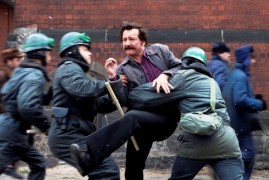Public and intimate life controversial political legend
In his portrait with Wajda does not avoid controversy, but above shows the key moments of ups and downs of the opposition Solidarity trade union movement that Walesa and his colleagues built. Where did this character come from? Where he took for his inspiration and strength to fight? Who were his friends and adversaries? Replies Wajda offers a classic film narrative, where the main emphasis is not just on one historical figure, but especially on the struggle for justice, equality and a better future ...
Wajda enter into private, even intimate life of Lech Walesa - leader of the Polish trade union Solidarnosc movement - and attempts to capture the phenomenon of the transformation of an ordinary laborer, a charismatic leader. Wales's controversial personality stirs passionate debate today, but it is certain that millions of people helped make inhibited dream of freedom and paved the way for political change, which at the time no one could imagine.
Wajda: "The most difficult topic of my career"
"I am well aware that" Walesa "is a difficult topic with which I had during my film career pětapadesátileté met, but no director made a film about him, that would satisfy me, so I simply had no choice," explains Andrzej Wajda why he decided to shoot the film. Was very important for him screenwriters. "Scenario Janusz Głowacki is the first and only, although, of course, was modified in some parts, but this is part of the natural process. This is avoided if you make a film, the object of interest - in this case, Lech Walesa - is a response to future viewers, "said Wajda.
What the director had a relationship to the subject of your film? 'I admired Wales from the first moment - I met him during the talks between the government and Solidarity Commission. Film it reflects everything. It is open to everyone, but I would like to reach a younger audience mainly because Lech is a good example, who could bring the interest to participate in political life, "explains Andrzej Wajda its intention.
The new Europe is born in Gdansk!
Film Walesa: One hope is visiting journalist Oriana Fallaci (Maria Rosaria Omaggio) in apartment block Lech Walesa (Robert Więckiewicz): here goes the interview of one of the most famous reporters of his time with the future Nobel Peace Prize laureate. Their emotionally charged conversations form the connecting thread of the whole story. Fallaci puts the legendary leader of the Solidarity movement issues that others do not want or dare to ask. Revealing the truth about a man endowed with strong charisma and amazing political intuition.
Biography as such begins at 70 20th century, not long after the communist government brutally suppressed the protests of the workers. Walesa is forced to sign a cooperation with secret services. The following plot describing his path to political maturity intertwine picture of family life Walesových. Relationship Lech and Danuta (Agnieszka Grochowska), their house full of children, problems of everyday life ... everything here is as important as policy.
Lech and Danuta wanted to live an ordinary life in his apartment Danzig, instead find themselves in the midst of dynamic political events that need to take a clear stand. It turns out that a strong man there is a much stronger woman, his wife. When Lech arrested and dragged to a police station for several months with his daughter in a stroller full of illegal leaflets, Danuta with other children facing state security agents, who yet again turning their apartment upside down. In his speech on the occasion of the 9th anniversary of the massacre of December 1970 Lech first shows his leadership qualities and the ability to enchant crowds.
Half a year later, in August 1980, is at the forefront of the strike in the Gdansk port as a leader of the Solidarity movement, a symbol of opposition and struggle for democracy.
After the declaration of martial law in 1981, Lech is arrested in his apartment in Gdansk. Its annual internment appears to be the test of time: Walesa will not give up, even though it is completely cut off from the rest of the opposition, and repeatedly rejected an offer to cooperate with the communist authorities. The warm welcome he receives after his release from prison, together with the acquisition of the Nobel Peace Prize unmistakable signs of the approaching final victory at the Round Table in 1989. Following the first partially free, democratic elections in the communist bloc, which ultimately results in a change of the political system. In the final scene of the movie Lech Walesa speaks to U.S. Congress and its expression preceded by the words: "We the people ..."
Source: tz, presskit

 Lech Walesa is like for us Václav Havel symbol of the fall of the totalitarian regime. Both were in jail, both were able to rouse the crowds. Andrzej Wajda is Poland's most successful director of all time, and is therefore understandable that Wales in the life story of the movie he just transferred. A spectator made him the most successful Polish film last year.
Lech Walesa is like for us Václav Havel symbol of the fall of the totalitarian regime. Both were in jail, both were able to rouse the crowds. Andrzej Wajda is Poland's most successful director of all time, and is therefore understandable that Wales in the life story of the movie he just transferred. A spectator made him the most successful Polish film last year.